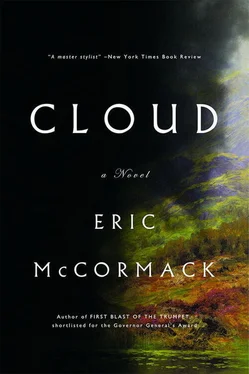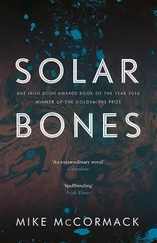So, I tried to make a case on my own behalf. A man — myself, for instance — might behave in a practical and self-serving way such as marrying for advancement, or working at some lucrative but unethical job on the pretext that if he didn’t do it, someone else surely would. Yet that man — myself, again — might still, in his deepest being, cling to principles fundamentally at odds with his actual behaviour. Indeed, this was perhaps how most men lived. Despite their failure to live up to a higher ideal, their belief in its existence allowed them to be relatively happy.
The logic of my case seemed somehow defective. Still, as before, I’d almost convinced myself of it.
On this note of relative happiness, lying beside the honest Alicia, I fell into a sound sleep.
At some point in my dreams, I was young again, running along a grey street in the Tollgate — or perhaps it was Duncairn— being pursued by a stranger with a scar on his cheek. Terrified and out of breath, I could run no longer and crouched with my hands up to shield myself. Then, in that odd way dreams work, I was all at once aware that I was looking into a mirror and that the stranger was no stranger — he was only the grown-up version of myself.
When I awoke the next morning, that dream was stuck in my mind. It seemed a concrete image of my ongoing anxiety over who I was and what I’d become. But, of course, it was only a dream and not to be taken too seriously.
That spring was important for me. Gordon and I made a weeklong trip to a large uranium mine in Northern Ontario. There, I took the leading role in presenting an offer to sell two new pumps as well as spare parts for older equipment. I’d also warned Gordon that I was going to propose the mine buy a ventilator. In most of these older mines, the workers depended on the feeble drafts of air that penetrated the tunnels — natural ventilation, it was called. Miners almost invariably suffered from lung problems caused by breathing in dust particles and gases, had to take a lot of time off work, and generally died young.
So, in my presentation I suggested to the mine’s negotiators that an efficient ventilation system would actually be a good (I didn’t use the word “ethical”) investment in the long run, and they agreed. Gordon was delighted and surprised. He’d been noticeably worn out during much of our trip and was more than happy to leave the sales up to me.
WE’D BEEN BACK in Camberloo only a week when he called me into his office at work one morning with a smile on his face.
“Well done, Harry!” he said. “Look what’s just arrived by courier.” He was holding the signed contracts for the deal at the uranium mine. “As far as I’m concerned, your apprenticeship is officially over. You are hereby promoted to Head of Sales for Smith’s Pumps and Ventilators. Congratulations!” He shook my hand vigorously and added, “This is altogether quite a significant day for us.”
I naturally assumed he was still talking about my promotion.
But when we got home from work that night, Alicia met us at the door.
“We’re going to have a baby!” she said to me, her dark eyes warmer than I’d ever seen them. “The doctor told me this morning. Isn’t it wonderful? Father was thrilled to bits when he heard.”
“Indeed, I was,” said Gordon, smiling.
She’d told him before she told me. She’d phoned him after she left the doctor’s — hence his comment to me about the great significance of the day. It was his idea that she should surprise me with the news when we came home, then we’d all go out and celebrate the pregnancy as well as my promotion. But it was clear which was more important to them.
I tried to sound enthusiastic, for Alicia’s sake, though I felt quite let down.
We went to a restaurant for dinner and Gordon ordered an expensive bottle of wine for the occasion. He and Alicia speculated excitedly about the baby throughout. I chimed in from time to time and they smiled fondly at me. Not much was said about my promotion.
THE BABY WAS BORN in Camberloo General Hospital at six-thirty on a bitterly cold January morning. Gordon was determined he’d be present at the birth, so I went with him although I knew I’d feel squeamish.
It turned out to be very hard to watch — an agonizing, protracted struggle. Alicia must have been suffering badly but didn’t complain. The baby was in the wrong position for delivery, so a lot of forceps work was needed. Eventually a boy emerged, but by then Alicia was in such a state she really didn’t care. Before he was swathed in cloths, a brief glimpse of the baby’s face showed he had a large bruise on his right cheek. An attending nurse assured Gordon and me that the bruise, caused by the forceps, was superficial and would soon disappear.
For the next twenty-four hours, Alicia lay in the recovery room, heavily sedated. Gordon and I took turns at her bedside, but we both happened to be present when she eventually awoke. Right away, she asked to see the baby. When the nurse laid him down beside her on the bed, Alicia had to be reassured that the mark on his cheek was only temporary. Then she concentrated on him and a look came into her eyes I’d never seen before. She began cooing words to the baby, her speech a little slurred: “Shweet ’ittle Franshish. Shweet ’ittle Franshish.” She kept repeating this over and over.
Gordon explained the meaning to me.
“We’d agreed that if it was a boy we’d call him Francis, in memory of my father,” he said. “I hope you don’t mind? Everyone called him Frank.”
I really didn’t mind, but I wished they’d asked me. Though the name was really quite fitting. There was indeed a frankness in the blue eyes of the little boy with the bruised cheek who lay there on the bed, staring up now at his wounded mother, now at his grandfather, and now at me, his father, as though appraising us. I couldn’t help wondering what he might have thought of a father who’d had no say in his son’s naming.
ALICIA EVENTUALLY came home to heal. A series of nannies helped look after little Francis, or Frank, which we all preferred. Much as she loved him, Alicia tired easily and often had to go to bed early.
When we got home from work at night, Gordon and I tried to abide by some of the old rituals. We still went to the library to sip a whisky and read. At that time he was reading an illustrated History of Scotland and would ask me questions, now and then, about some of the old customs. Around nine, the nanny would leave for home after making sure Frank was asleep in the nursery, which was the room adjoining our bedroom. At ten, Gordon would go to bed and I’d look in to check on Frank before slipping into bed beside Alicia, careful not to disturb her sleep. If Frank woke during the night, I’d see to his needs.
Such was our new routine for many weeks as we waited for Alicia to regain her strength.
One night during that period, when Gordon and I had made our ritual retreat to the library after dinner, he sipped his brandy, cleared his throat, and embarked on what I soon realized was to be a fatherly talk. The subject: a mature relationship between husband and wife.
“I often think about what you told me when we first met— about your great love affair in Scotland,” he said. “Your idealism was one of the things I liked about you at the time.
“As you’ve no doubt gathered by now, idealism isn’t in my own makeup. I’ve always been a much more pragmatic type. Take my marriage to Alicia’s mother, for example. I was very fond of her and deeply saddened when she died so young. But neither of us had married strictly for love. No, it was for much more practical reasons. I worked for her father, who owned a small engineering firm that manufactured machine parts. He and I had an understanding that if I married his daughter I’d become his partner. Which is exactly what happened. Then when he retired, I changed the firm’s direction to more specialized work: it became Smith’s Pumps and Ventilators.
Читать дальше











